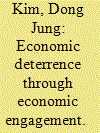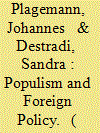|
|
|
Sort Order |
|
|
|
Items / Page
|
|
|
|
|
|
|
| Srl | Item |
| 1 |
ID:
164672


|
|
|
|
|
| Summary/Abstract |
This essay suggests that a state’s economic engagement with a potential military aggressor can be understood as an attempt to increase its deterrent capability. It first introduces the concept of economic deterrence and derives three strategies of economic deterrence from classic deterrence theory: (1) punishment, (2) denial, and (3) diminution. Next, it suggests that economic engagement can be employed to advance the ability, credibility, and communication for economic deterrence, as well as to create favorable conditions to adopt the three economic deterrence strategies. Finally, the essay discusses the requirements for effective employment of engagement policy for economic deterrence.
|
|
|
|
|
|
|
|
|
|
|
|
|
|
|
|
| 2 |
ID:
164671


|
|
|
|
|
| Summary/Abstract |
Scholars have examined the influence of intraparty factionalism on government stability and policy development in democratic systems for some time, yet factionalism in major political parties in the United States remains understudied. This article draws on scholarship on minority influence from social psychology, as well as studies of party polarization and coalitions in comparative politics, to explore the impact of factionalism in the US Congress on support for foreign policy initiatives. It proposes a novel framework to examine the longitudinal impact of the Freedom Caucus or Tea Party in the Republican Party on foreign policy initiatives championed by the majority. It conducts a plausibility probe of the model linking factionalism, minority influence strategies, and delays in establishment progress on foreign policy through case studies of comprehensive immigration policy reform debates and Trade Promotion Authority for the Trans-Pacific Partnership. The paper concludes that factions that demonstrate persistence and consistency in support of minority positions do appear to influence the scope and direction of foreign policy commitments, votes on major legislation, and nonvotes over time. It also offers suggestions for future study of more contingent and multilinear models of foreign policy processes in comparative perspective.
|
|
|
|
|
|
|
|
|
|
|
|
|
|
|
|
| 3 |
ID:
164673


|
|
|
|
|
| Summary/Abstract |
Political leaders are ultimately responsible for their country's foreign policy, but our understanding of how executive turnover affects the likelihood of international treaty ratification remains limited. For contributing to this debate, I define leader change as the replacement of the executive leader by a new one who relies on different social groups for support. Focusing then on those cases where new leaders can assume office only from predecessors who plausibly supported treaty ratification, I expect that—in light of the predecessor's support for an agreement and the change in the domestic support base—leadership turnover makes ratification less likely. The empirical implication is tested with quantitative methods using data on multilateral treaties of the post–Cold War era. The main findings and a series of additional analyses provide strong and robust evidence for the theoretical argument. This research sheds new light on the determinants of multilateral cooperation as well as the role of government leaders in international affairs and foreign-policy decision-making.
|
|
|
|
|
|
|
|
|
|
|
|
|
|
|
|
| 4 |
ID:
164674


|
|
|
|
|
| Summary/Abstract |
This paper examines the appointment of male versus female career diplomats to ambassadorial posts. We assess the role played by ambassadors’ individual characteristics, including education, marital status, and number of children, and host countries’ characteristics, such as quality of life and regime type, in determining if a male or female is appointed to ambassadorial positions to represent the United States in foreign countries. The time frame of this study is the entire presidencies of Bill Clinton and George W. Bush (1993–2008), during which 603 career diplomats were appointed as ambassadors. The study provides empirical evidence that there remain significant differences between women and men serving as ambassadors. Female ambassadors are more likely to be single and have no children and are less likely to be Ivy League graduates than male ambassadors. Furthermore, they are more likely to be appointed to countries with lower quality of life and better human rights records. Finally, time plays a role in the likelihood of a woman being appointed as ambassador.
|
|
|
|
|
|
|
|
|
|
|
|
|
|
|
|
| 5 |
ID:
164676


|
|
|
|
|
| Summary/Abstract |
This study explores the intra-elite role contestation and resolution within the State Department during the Portuguese Revolution, focusing on Henry Kissinger and the US ambassadors to Portugal, Stuart Nash Scott (1973–75) and Frank Carlucci (1975–78). The Portuguese revolutionary period presents an ideal case for the exploration of intra-elite disagreements in defining foreign-policy roles; specifically, the national role conceptions that elites hold about their states’ foreign-policy behavior toward other states. This case presents an interesting puzzle to test and build on the theory's explanatory value at the domestic and individual levels of foreign-policy making: why did Kissinger's proposed role conceptions not prevail when he was one of the most significant foreign-policy entrepreneurs at the time? The analysis builds on previous theory-development efforts by considering a new institutional location for national role conceptions—the State Department—and a new type of relevant actor, the ambassador. In the process, the study makes contributions to the literature on the agency of ambassadors in foreign policy, as well as to the growing literature on domestic contestation and resolution of national role conceptions.
|
|
|
|
|
|
|
|
|
|
|
|
|
|
|
|
| 6 |
ID:
164680


|
|
|
|
|
| Summary/Abstract |
What kind of foreign policy do populists execute once in power? Based on the existing literature, we conceptualize populism as a set of ideas whose two core elements are anti-elitism and antipluralism. From this we develop a set of hypotheses regarding both substantive aspects of foreign policy as well as foreign policy–making processes of populist leaders in government. An analysis of Indian Prime Minister Narendra Modi's foreign policy record serves as a first plausibility probe of our hypotheses. We find that our concept of populism carries most explanatory value in the procedural aspects of foreign policy making as well as in its communication, less so in those aspects relating to the goals or substance of foreign policy. Whereas foreign policy under Modi's populist leadership is highly centralized and personalized, the traditional foreign policy establishment, including most notably the Ministry of External Affairs, has lost some of its previous authority. Engaging the Indian diaspora abroad emerged as another characteristic of populist foreign policy making. By contrast, the case of India does not confirm our hypothesis regarding a preference of bilateralism over multilateralism, nor does populism necessarily preclude investing in global public goods.
|
|
|
|
|
|
|
|
|
|
|
|
|
|
|
|
| 7 |
ID:
164679


|
|
|
|
|
| Summary/Abstract |
Although on the surface Russia remains distant and disengaged from the South China Sea (SCS) dispute, its comprehensive strategic partnership relations and large-scale arms deals with China and Vietnam—Russia's closest Asian allies but also major rival parties to the dispute—reveal that Moscow has strategic interests and goals that affect, directly or indirectly, the evolution of the dispute. Russia's ambivalent stance toward the dispute in the form of supporting both China and Vietnam is the manifestation of two different modes of great power behavior that unfold at different levels but happen to intersect in the SCS. One is systemic balancing, which is aimed at checking and blocking the strongest power in the system—the United States. The other is regional hedging, which combines engagement and containment and helps to avoid taking one side at the obvious expense of another. These two different modes of great power behavior coexist in Russia's behavior toward the SCS. Untangling the two levels sheds light on the essence and evolution of Russia's policies in the region, which have created a win-win situation, however imperfect, for China and Vietnam and have contributed to the formation of a more manageable negotiation environment.
|
|
|
|
|
|
|
|
|
|
|
|
|
|
|
|
| 8 |
ID:
164677


|
|
|
|
|
| Summary/Abstract |
This article uses the issue area of global internet governance to investigate US hegemony in the face of a rising hegemonic challenger, China. The paper exploits the controversies around the revised International Telecommunication Regulations at the 2012 World Conference on International Telecommunications in order to examine the preferences of individual states with regard to the internet's basic principles and whether these were influenced from the outside. A quantitative analysis shows that domestic political structures that substantively clash with US liberalism, together with the unequal spread of ICT across the globe, best explain the adoption of the new regulations. There is only minimal evidence of hegemonic influence; security and trade relations were not found to influence state positions. However, aid from the US pushed autocracies toward alignment with these power's preferences. No such effect was found for democracies.
|
|
|
|
|
|
|
|
|
|
|
|
|
|
|
|
|
|
|
|
|